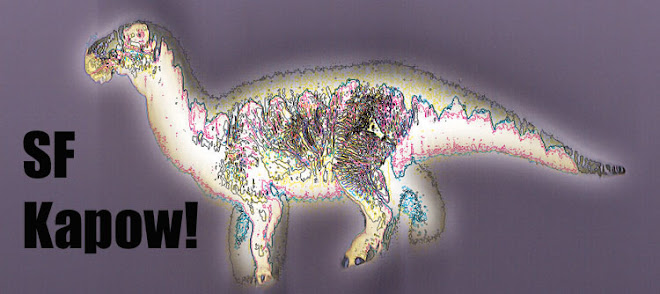But I saw a fair bit of original Trek, regardless. It was on in endless reruns on Saturday and Sunday afternoons, or in the summers when there was nothing else to watch. And it was nominally SF. So I caught an episode here and an episode there. I learned about flat-foreheaded Klingons, energy beings, pon farr, styrofoam rocks, evil computers the size of Buicks, and "show me this Earth thing called 'kissing.'"
Now that I'm older and (theoretically) less easily distracted by shiny objects and big explosions, I've come to appreciate that there was often solid storytelling behind original Trek. In preparation for seeing the movie on the weekend, I've collected the whole series from my local pushers library and I've been watching season one.
Holy crap, is that a contrast to the original movie.
I know the movies are another animal compared to the TV show, but the more episodes I watch the deeper the gulf seems. The film is all about proving there's no such thing as a no-win scenario. It starts with Kirk cheating his way through the Kobayashi Maru test. It ends with him recapitulating the events that led to the death of his father – except that he saves the captain and the ship and Earth and all the important cast members and gets a promotion and a medal. He never learns a damn thing about loss. He never faces loss.
Compare that to original Trek. I just watched "Space Seed," the famous Khan Noonien Singh episode. It has some egregious bits of 1960s stuck in there, especially the sexist plot about the female crewmember who falls so hard for Khan she'll help him take over the ship after 20 minutes in his presence.
But – there's a scene in which Khan has seized control. He needs the crew to help him steal the Enterprise. He locks Kirk in a decompression chamber and starts pumping out the air while the senior crew watches. If one of you will join me, Khan says, I'll let him live. They all sit there, impassive. Khan points out that he'll throw them in there one by one until someone cracks. Still they sit there. They're prepared to let the captain die, and then die themselves, because helping Khan is against everything they stand for.
That keeps coming up again and again in the original series. Characters stand for things. They stand for them because they think they're right. Spock opposes killing hostile aliens in "The Galileo Seven," for moral reasons. Kirk wants proof that an actor really is a genocidal dictator in "The Conscience of the King," he won't just go in guns blazing. Characters argue about logic, reason and ethics.
Can you imagine the film's Kirk and Spock having a discussion about ethics not conducted at full volume, ending with a fistfight?
Every action by Spock and Kirk in the film is undertaken for personal reasons. Neither joins Starfleet because they believe in its mission. And saving the Earth? Well, I think we're pretty much all in favour of that.
I've said this before, but people do sometimes act based on ethics and ideology they've arrived at on their own. That's why original Trek, for all its cheese, is growing on me. It's why I'm tired of the modern trend of having every character action be motivated by nothing but selfish, petty, personal concerns. I don't care of Kirk gets over the death of his father. I care that he has some goddamn ideals.
As a couple of hours light entertainment, the movie is fine. There are shiny objects and big explosions, and the folks playing Spock and McCoy and Uhuru did a good job. Simon Pegg was hilarious as Scotty, and in a film so inconsequential, he could have been introduced earlier. But really, you'd get more storytelling out of two or three hours spent watching Shatner and Nimoy dodge styrofoam rocks.

1 comment:
bravo! now i don't feel bad about not having seen the new star trek movie. i'll go back to watching the original and next generation in the sci-fi channel.
Post a Comment